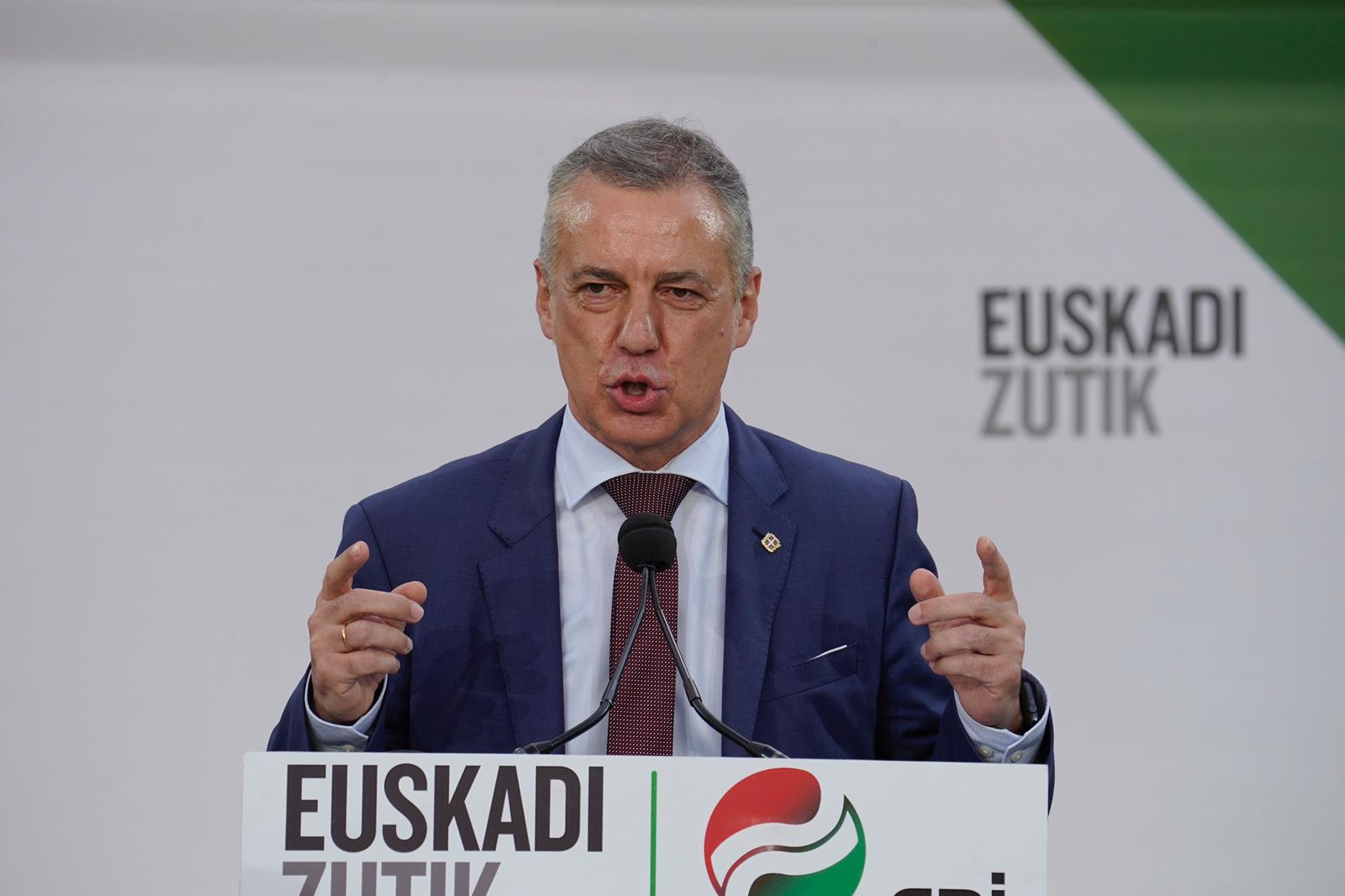Midwife: "The PNV and the PSE have placed the services that the public should in the logic of the market, have prioritized neoliberal policies and the damages that this entails are directly suffered by women"
- The COVID-19 crisis has made the situation of feminist agents more precarious than before and denouncing the cutbacks planned by the authorities, not feminist agents! Recently, various associations, social partners and equality techniques have made the text public. They have denounced that feminist associations are an important asset in society, but that public institutions do not guarantee their functioning. In this respect, we have asked the Emagin association, one of the signatories to the letter, about the reading they make of their last mandate on equality. In addition to the last four years, we have talked about the management of the health crisis and about the future.

As for the area of equality, what assessment do you make of the last legislature? Is there anyone you think is worth mentioning?
Equality policies are directly related to those developed in other areas. On many occasions, we have mentioned that patriarchy goes through everything and, therefore, one of the lines of equality policies must be, among others, that of transversality: equality must become a key notion in all policies developed by public institutions and in the ways in which they are managed. That is not the case today at all. Progress has been made in some areas where the institutions have been more committed, but radical changes must be promoted to put an end to patriarchal oppression, and now it is a question of sharing the situation of some women.
In Hego Euskal Herria we have essential elements for the development of equality policies: we have and are weaving many feminist equality technicians; women have more and more sustainable schools to empower us and we are gradually providing new infrastructures and spaces to many peoples. Undoubtedly, we have come here thanks to the struggle of the Feminist Movement. But it's not enough, because you have to change the direction of those policies that you're trying to write in capitals.
"While public services are being reduced and privatized and men are not taking care of them, hiring household employees is the overall strategy of unfamiliarity that has been imposed. And that's what's driving the PNV."
In recent years, we have experienced tragic privatisation processes in the CAV. The PNV and the PSE have placed in the logic of the market the services that the public should have, have prioritized neoliberal policies and the damage that this entails is directly suffered by women. The conflicts that have occurred in nursing homes, schools, school canteens and cleaning are good examples of this. If we privatise public services, we are imposing on women all the workload that derives from it, and feminists know that care work is totally linked to job insecurity, to labour market segmentation, to poverty, to double or triple practice, to the marginalisation of life projects, to social exclusion and to male violence.
The surveillance regime in the CAV is absolutely unfair and vigilance drives reactionary ethics. Despite the fact that we are experiencing a process of unfamiliarity, even today the families and within them the women are primarily responsible for the care. Those who are prioritized are those who are at home and in affective and family relationships, the best care, those we desire. Some families (women) have had the opportunity to slightly reduce the burden of care, provided they have sufficient economic and social resources. However, this is not because public institutions have assumed responsibility for the right to custody, but because domestic, precarious and irregular services have been contracted in the family. While public services are being reduced and privatized, and men are not taking care of them, hiring household employees is the overarching strategy of unfamiliarity that has prevailed. And that's what's driving the PNV.
The lack of policies focused on feminism has become more evident than ever with the management of the health crisis, in which capital once again overlaps life. What reading do they make of the management carried out and in progress?
We don't know what pandemic management should be like, it's certainly a very complex issue. In any case, we would point out that we have been faced with a management full of contradictions. In the name of life, the speeches of war have triumphed; in the face of a new situation that requires a great deal of pedagogy, a police state has been imposed on us. Individual and collective freedoms have been completely beaten, based on collective terror. We heard time and again that the responsibility lies with individuals, and it seems that the social and political organization we had before has nothing to do with what is happening.
However, COVID-19 has highlighted our ways of managing life and death, the shortcomings of our society, the shortcomings of our communities. Despite its new characteristics, it has become clear what is necessary and what is prioritized by current governments in our lives. We are facing an ecological collapse, a crisis of very deep care, and for example, on the lips of those who run the Basque Government, we have only heard the revival of the economy and the defence of the macro-infrastructures since the electoral campaign was launched. Who is abandoning life? Who is prioritizing some lives, those that they understand perfectly productive, over others?
"We are facing an ecological collapse, a crisis of very deep care, and for example, in the mouths of those who run the Basque Government we have only heard the revival of the economy and the defense of macro-infrastructures since the beginning of the electoral campaign"
We have to talk about profound changes, about policies that put life at the centre, about people, about discriminatory situations, about whom we have condemned them on the shores, who continue to die at sea these days. What's playing for us is which lives we want to save and which we don't. We cannot afford it.
It is a sign that this management moves us further away from a more egalitarian society, which we have just denounced, that subsidies to feminist associations and organisations by the year 2020 come with cuts due to the health crisis. What scenario does it place us in?
They are only signs of the eleven cuts that can come, which can happen with the subsidies of the associations. We believe that social movements, feminists, associations of peoples are essential for communities to turn... Belonging to the group is of great importance in social life, because in addition to helping to strengthen individual and collective identities, it helps us to make our present stable and lasting. Partnerships are essential and, although our funding channels must be varied, it is the responsibility of public institutions to support our projects and to act in the general interest.
The Feminist Movement is essential to build a new social model, a movement that puts our lives and territories at the centre. And it's clear to us that the only way to do that is in common. In order for our proposals to be truly radical, in order for them to become political, we must share with others and attack the common.
"Discourses for equality must be accompanied by both support and real means, which goes through budgets"
Speeches in favour of equality must be accompanied by real support and means, and that is what the budgets are about. They will hardly express their commitment to equality if they re-leave women with all the workload that this crisis has created. It's no coincidence that 99 percent of women working as inmates are migrants.
What are your demands?
Public entities should focus on the basic elements and not on capital accumulation. This crisis allows us to agree how we are going to reorganize coexistence and make the necessary proposals to make it possible in all areas; in the intimate spaces and in the legal norms. In this way, maintaining the commitment to transform our ways of life will be the main guarantee of leading a dignified life to the center. To this end, we would like to highlight three key points. The first key is the idea of the vulnerability and solidarity of life. We depend on the environment, because in our territories life develops and we need each other, we are not autonomous beings who merely produce and consume. Dependence is a common characteristic of these beings, we have to live in permanent contact and we have to care for life inevitably. We have to recognize the boundaries around us, beings, the planet, nature -- they're finite, like life. That's why you need to take care of yourself, take care of yourself.
"This crisis allows us to agree how we are going to reorganize coexistence and make the necessary proposals to make it possible in all areas; in the intimate spaces and in the legal norms"
The second is that all lives have the same value. Some are worthless than others, although this social organization only some privilege: men, white, bourgeois, heterosexual, adults and functionally normative. Care must therefore be taken of where situations of discrimination arise. It cannot focus solely on the consequences of oppression.
The third key is that we cannot fail to look at the organization of work to care for life. To overcome this, we have to put in the process of democratization the social, economic, institutional and symbolic relations behind care.
The public institutions and the parties that manage them must politically recognize the care and place the organization of the care work in a process of democratization. A community public care system for a fairer distribution should be put in place and, as a matter of urgency, dignify the living conditions of people engaged in care. Many women behave like they're slaves, we can't keep caring.
Hauteskundeak izan dira oraingoan Euskal Herriaren mendebalde honetan, eta horien ondoren gerta ohi denez, erabateko garaipen loriatsua (auto)aldarrikatzera abiatu da prestu irabazten lar ohituta dugun EAJ.
Luza dakioke gaur EAJri esaldi klasikoan egiten den galdera: Non dago... [+]
Iñigo Urkullu jarduneko lehendakariak eta bere alderdiak hauteskunde kanpainan esan dutenez, “ezkerrekoak eta eskuinekoak jada ez dira existitzen”. Gaur egun EAEn nagusi den politikaren alternatibarik existituko ez balitz bezala, hau da, ez balego bezala... [+]
Data: 2020ko uztailaren 12a (igandea). Ordua: 13:00. Tokia: H. herriko bozkaleku nagusiko kanpoaldean dagoen banku bat. Eguraldia: orduak iraun dituen euri jasa baten azken tantak. Jende mugimendu etengabea atarian. Talde handirik ez. Gehienak banaka, binaka, trioren bat... [+]
On this occasion there have been elections in this western part of Euskal Herria, and as often happens, the PNV, very accustomed to winning, has launched itself to proclaim a glorious (self-)absolute triumph.
Today we can ask the PNV the question in the classical phrase: Where... [+]




















